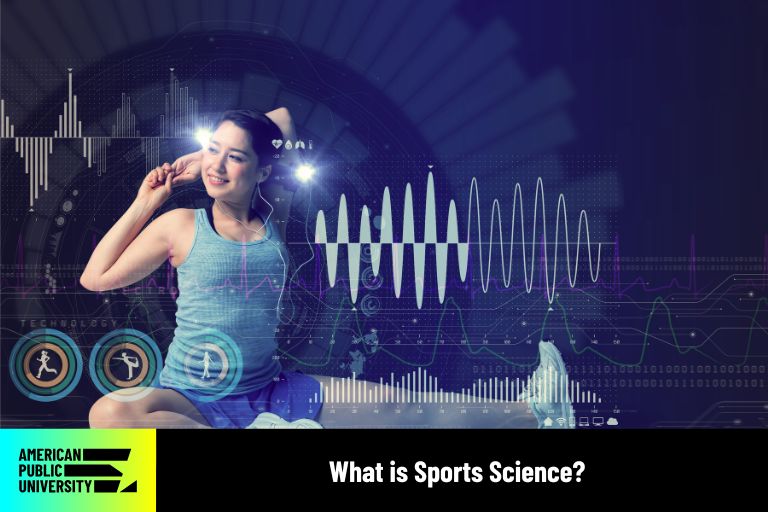01/21/2025

Understanding the Field of Sports Science
If you have a strong interest in health and wellness or want to learn more about the science at all levels of sports, here’s a breakdown of key areas within sports science and their contributions to improving athletic performance.
Definition of Sports Science
Sports science is an interdisciplinary field that applies scientific principles to understand and improve athletic performance, exercise and physical activity.
It combines branches of science, including physiology, psychology, biomechanics, and nutrition to study how the body functions during exercise, physical training and to potentially prevent injury.
Sport science is also known as exercise science, human performance, or sport and exercise science.
Key areas include:
- Exercise physiology
- Biomechanics
- Sports psychology
- Sports nutrition
- Sports medicine
- Performance analysis
- Rehabilitation and injury prevention
Importance of Sports Science in Athletic Performance
Sports science plays a crucial role in enhancing athletic performance by providing a scientific understanding of the human body and how it responds to exercise and physical activity. It has the potential to help athletes and coaches develop individualized training programs, optimize nutrition and recovery strategies.
According to a 2020 study, "sports science research can help lead to evidence-based approaches that will allow athletes and active individuals to exercise in optimal ways."
Sports science also informs the development of sports equipment, technology and facilities. From identifying the best materials for helmets and equipment to developing more sustainable sports facilities, these innovations may improve human performance and enhance safety.
Applications of Sport Science
Performance Enhancement
Sports science performance enhancement refers to the use of scientific principles and evidence-based practices to improve an athlete’s physical, mental, and tactical performance in sports. Some examples of key applications in sport science may include:
Training programs: One of the key applications of sports science includes developing scientifically-backed training plans to target specific areas of athletic performance like strength and speed. By customizing training to athlete's specific needs, the outcome may be more effective.
Biomechanics: By analyzing how an athlete moves, a sport scientist may be able to help improve their performance, technique or identify inefficiencies.
Injury prevention and rehabilitation: Professionals may used evidence-based programs to inform how taping and support devices like braces or splints could help speed up recovery or prevent future injury.
Degree Options and Career Opportunities
Sports science majors may choose to study specific courses within key disciplines that provide in-depth knowledge and practical skills that are more in line with future career goals. Programs may focus on physical education but may include training in mental health, physics, and other sciences. Some specializations are:
- Coaching
- Strength and conditioning
- Medical fitness and rehabilitation
- Disability studies
- Fitness specialist
A bachelor's degree or advanced degree in sports science may lead to a range of career options across disciplines and multiple industries, including professional sports, healthcare, education, technology, fitness and more. Sports science graduates may pursue opportunities in sports clubs, gyms, hospitals, and research institutions or consider advanced degrees.
Some sports science graduates also go on to become exercise physiologists, working in cardiac rehabilitation or other clinical settings.
Graduates may explore careers in sports and health such as:
- Exercise physiologist
- Physical education instructor
- Sport psychologist
- Recreational or fitness instructor
Research Methods and Key Concepts
Exercise Physiology and Nutrition
As a major concentration of sports science, exercise physiology studies how the body responds to physical activity and how exercise impacts different systems in the body.
Some key topics may include:
- Energy systems and metabolism
- Cardiovascular and respiratory adaptations to exercise
- Muscle physiology
- Fatigue and recovery
- Exercise testing and prescription
Nutrition is another concentration of sports science that aims to improve athletic execution, support recovery and help athletes maintain physical health. Sports scientists learn the fundamentals of proper nutrition and design plans to support specific diets.
Some key topics include:
- Macronutrients and micronutrients
- Hydration
- Supplements
- Sport-specific nutrition
- Weight management
Real-World Example of the Impact of Sports Science
In a 2021 case study, sport science was applied to improve Felisha Johnson's shot put performance. A combination of biomechanical analysis, an equation for projectile motion, and immediate video feedback allowed her coach to make precise adjustments to her technique. As a result, her velocity increased and her release angle decreased at the 2016 U.S.A. Track and Field Olympic Trials, which helped her earn a spot in the Rio de Janeiro Olympics.
Combining sports science with expert coaching may lead to more precise, effective, and personalized training that enhances athletic performance. The scientific insights help coaches optimize technique, manage recovery, and prevent injuries, while the coaching experience translates these insights into actionable strategies for success.
Emerging Trends and Technologies in Sports Science
Emerging trends in sports science include the use of increasingly popular wearable technology like the Oura Ring, smartwatches that provide detailed analytics on sleep, movement and 24/7 activity.
Artificial intelligence-driven tools (AI) are driving performance analysis and injury prevention from video analysis platforms and other technologies.
New technologies in sports science include the use of virtual reality and augmented reality to enhance athlete training and rehabilitation. Virtual reality simulates game situations and may help with reaction times, decision-making and mental focus.
Sports scientists are also exploring the use of genomics and epigenomics to understand the genetic and environmental factors that influence athletic performance.

